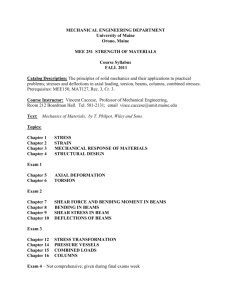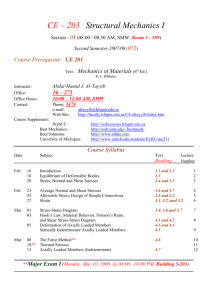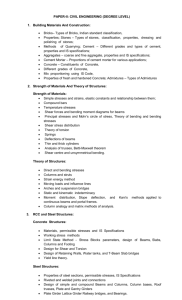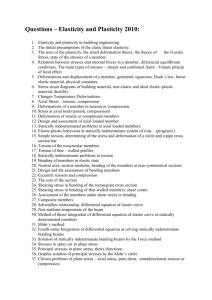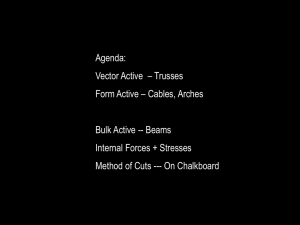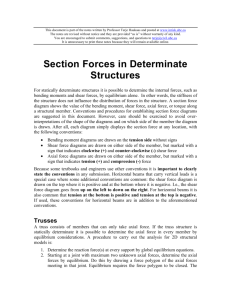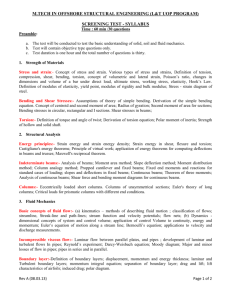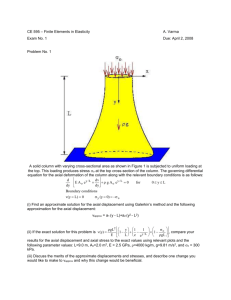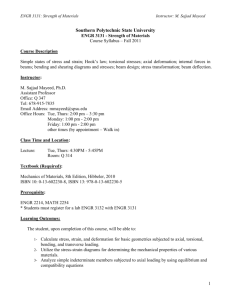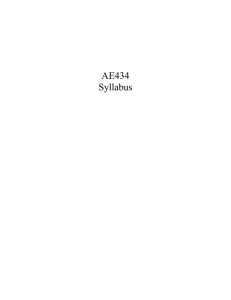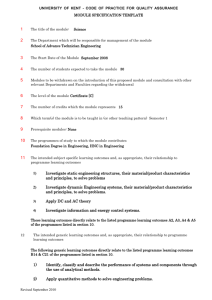Theory of Structures
advertisement
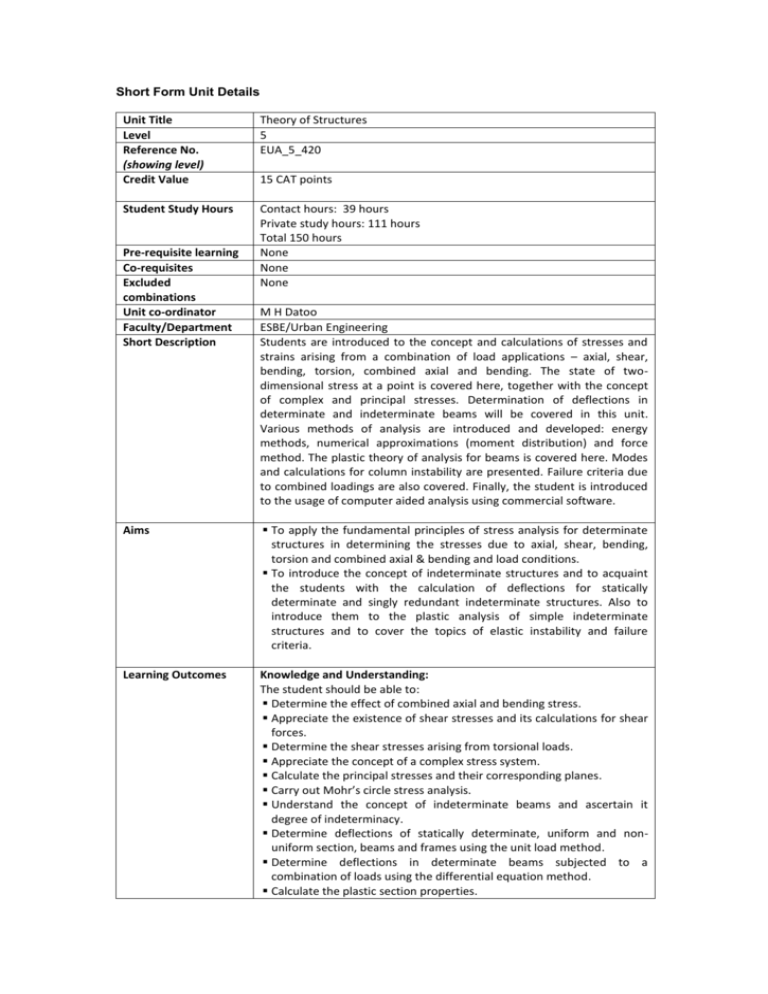
Short Form Unit Details Unit Title Level Reference No. (showing level) Credit Value Theory of Structures 5 EUA_5_420 Student Study Hours Contact hours: 39 hours Private study hours: 111 hours Total 150 hours None None None Pre-requisite learning Co-requisites Excluded combinations Unit co-ordinator Faculty/Department Short Description 15 CAT points M H Datoo ESBE/Urban Engineering Students are introduced to the concept and calculations of stresses and strains arising from a combination of load applications – axial, shear, bending, torsion, combined axial and bending. The state of twodimensional stress at a point is covered here, together with the concept of complex and principal stresses. Determination of deflections in determinate and indeterminate beams will be covered in this unit. Various methods of analysis are introduced and developed: energy methods, numerical approximations (moment distribution) and force method. The plastic theory of analysis for beams is covered here. Modes and calculations for column instability are presented. Failure criteria due to combined loadings are also covered. Finally, the student is introduced to the usage of computer aided analysis using commercial software. Aims To apply the fundamental principles of stress analysis for determinate structures in determining the stresses due to axial, shear, bending, torsion and combined axial & bending and load conditions. To introduce the concept of indeterminate structures and to acquaint the students with the calculation of deflections for statically determinate and singly redundant indeterminate structures. Also to introduce them to the plastic analysis of simple indeterminate structures and to cover the topics of elastic instability and failure criteria. Learning Outcomes Knowledge and Understanding: The student should be able to: Determine the effect of combined axial and bending stress. Appreciate the existence of shear stresses and its calculations for shear forces. Determine the shear stresses arising from torsional loads. Appreciate the concept of a complex stress system. Calculate the principal stresses and their corresponding planes. Carry out Mohr’s circle stress analysis. Understand the concept of indeterminate beams and ascertain it degree of indeterminacy. Determine deflections of statically determinate, uniform and nonuniform section, beams and frames using the unit load method. Determine deflections in determinate beams subjected to a combination of loads using the differential equation method. Calculate the plastic section properties. Understand the basic principles of plastic theory and be able to apply these to the analysis of indeterminate beams. Determine the Euler buckling load for simple struts, including compound sections, having different support end conditions. Analyse indeterminate beams for moments and reactions using the moment distribution method. Perform stress analysis using failure criteria to ascertain failure under combination of loadings. Use computer PC based package for simple structural analysis. Perform, analyse and interpret results from structural tests. Intellectual Skills: Use mathematical methods to analyse engineering problems. Analyse and solve engineering problems. Apply engineering know-how and understanding in the solution of design problems. Practical Skills: Use the library, Internet, and other sources effectively. Use computer packages. Transferable Skills: Apply analytical and mathematical skills. Work independently. Manage tasks and solve problems with predetermined deadlines. Employability Teaching and learning pattern Lectures and tutorials supplemented by printed handouts, worked solutions to tutorials and past examination questions. The lectures are complemented by laboratory exercises and supervised computing sessions. Indicative content Axial Stress Derivation and application of axial stress. Bending Stress Derivation and application of bending stress on singly/doubly symmetric sections. Combined Stress Combined stress due to axial and bending. Shear Stress Complementary shear stress. Derivation and application of shear stress. Shear stress distribution. Complex Stresses Transformation of stresses, principal stresses, Mohr's Circle. Moment Distribution Degree of indeterminacy; Fixed end moments; Distribution Factors; Carry over factors; Bending moment and shear force diagrams. Unit Load Method Energy method; Volume integrals; Translations and rotations of determinate beams and frames. Non-uniform section. Force Method Compatibility conditions; Influence coefficients; Beams of singe redundancy. Plastic theory Plastic section properties; Hinge formation and application to beams; Upper and lower bound theorems. Column Instability Introduction to column instability; Euler buckling; Support end conditions; Calculations of buckling load, including for compound sections. Failure Criteria Rankine, Tresca and von Mises; Failure due to combined axial, bending, shear and torsional loads. Computer Aided Analysis Degrees of freedoms; Axes systems; Nodes; Supports; Section properties; Elastic properties; Load applications; Supports; Output interpretation for moments, forces, deflections and stresses. Assessment Elements & weightings The unit is assessed by a combination of examination and coursework: 70% 30% Indicative Sources (Reading lists) 3 hour end of unit written examination. Coursework Core Bhatt, P; Structures, Longman, 1999. Cain & Hulse; Structural Mechanics, MacMillan, 1991. Coates, Coutie & Kong, Structural Analysis, Nelson, 3rd Ed., 1992. Croxton & Martin; Solving Problems in Structures, Volume 1, Longman, 1991. Croxton & Martin; Solving Problems in Structures, Volume 2, Longman, 1990. Durka, Morgan & Williams; Structural Mechanics, 4th Edition, Longman, 1996. Jennings A; Structures – From Theory to Practice, Spon, 2004. Marshall & Nelson; Structures, 3rd Edition, Longman, 1990. Megson; Structural and Stress Analysis, Arnold, 1996. Moy, S S J; Plastic Methods for Steel & Concrete Structures, Macmillan, 2nd Ed., 1996. Montague & Taylor; Structural Engineering for First Year Students, McGraw-Hill, 1989. Spencer, W J; Fundamental Structural Analysis, Macmillan, 1988. Smith; Introduction to Structural Mechanics, Palgrave, 2001. Smith; Materials and Structures, 2nd Edition, Longman, 1986. Thompson, F & Hayward; Structural Analysis using Virtual Work, Chapman & Hall, 1986. Whitlow; Materials and Structures, 2nd Edition, Longman, 1991. Williams M S & Todd, JD; Structures – Theory and analysis, Macmillan, 2000. Young, B W, Energy Methods of Structural Analysis, Macmillan, 1981.
![Applied Strength of Materials [Opens in New Window]](http://s3.studylib.net/store/data/009007576_1-1087675879e3bc9d4b7f82c1627d321d-300x300.png)
